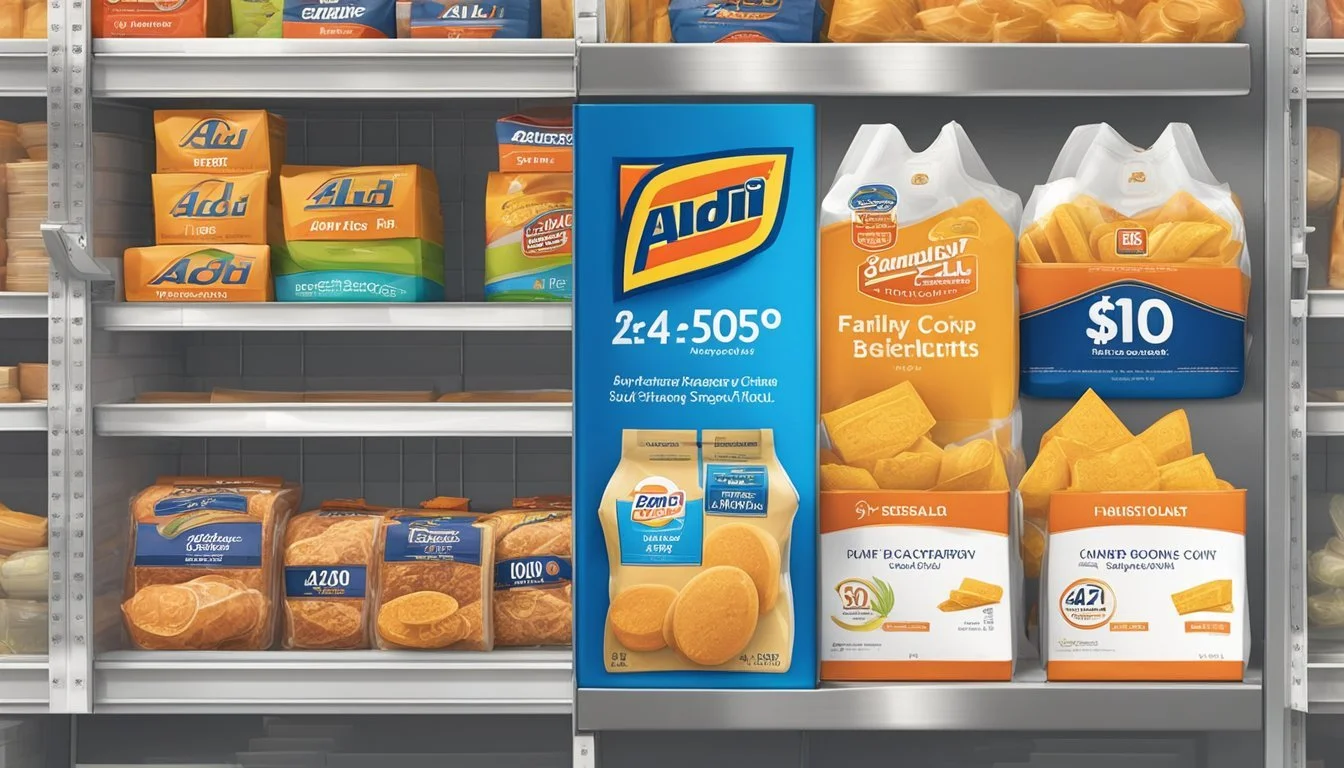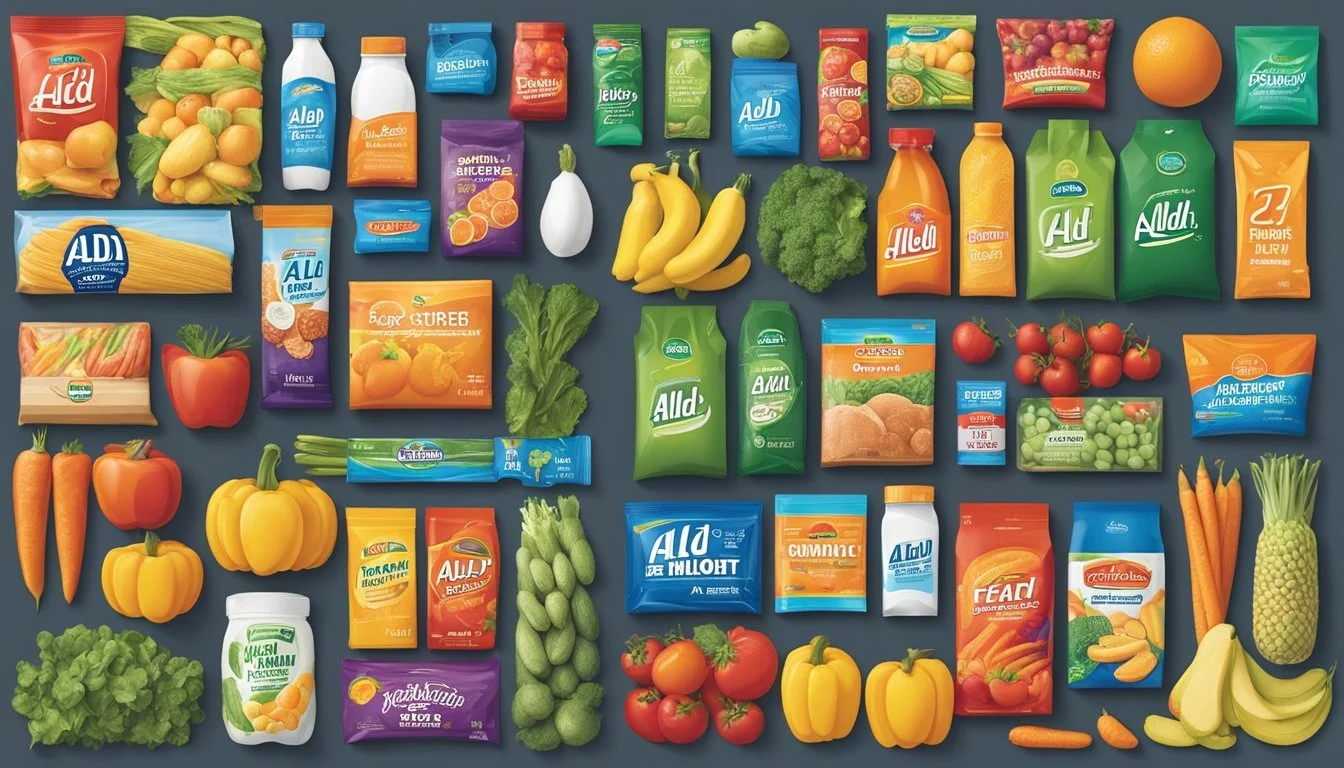Aldi vs Family Dollar
Comparing Prices, Quality, and Selection
Grocery shopping can be a significant expense for many households, making the choice of store crucial for budget-conscious consumers. Aldi and Family Dollar are two popular options known for their low prices, but they offer distinct shopping experiences.
Aldi generally provides better overall value for groceries compared to Family Dollar. Aldi's focus on private-label products and efficient store layouts allows them to offer high-quality items at competitive prices. Their selection of fresh produce, meats, and dairy products is typically more extensive than Family Dollar's offerings.
Family Dollar, while not primarily a grocery store, does stock a range of food items and household essentials. Their strengths lie in offering name-brand products at discounted prices and providing convenience for quick purchases. However, their grocery selection is often limited compared to dedicated supermarkets like Aldi.
Company Overviews
Aldi and Family Dollar are two prominent discount retailers with distinct histories and business models. Both companies have carved out unique niches in the competitive retail landscape.
History of Aldi
Aldi's roots trace back to 1946 in Essen, Germany, when brothers Karl and Theo Albrecht took over their mother's small grocery store. The company name "Aldi" is short for Albrecht Diskont.
In 1960, the brothers split the business into Aldi Nord and Aldi Süd due to a disagreement over selling cigarettes. Aldi Süd expanded internationally, entering the U.S. market in 1976.
Aldi's business model focuses on offering high-quality private-label products at low prices. The company achieves this through efficient operations, limited product selection, and a no-frills shopping experience.
Today, Aldi operates over 2,000 stores across 36 states in the U.S. and continues to expand rapidly.
Profile of Family Dollar
Family Dollar was founded in 1959 by Leon Levine in Charlotte, North Carolina. The company started as a single store offering low-priced merchandise.
Family Dollar's business model targets low to middle-income shoppers in urban and rural areas. The stores offer a mix of name-brand and private-label products across various categories, including groceries, household items, and apparel.
In 2015, Dollar Tree acquired Family Dollar for $8.5 billion, creating a combined entity with over 15,000 stores across 48 states and five Canadian provinces.
Family Dollar stores are typically smaller than traditional supermarkets, averaging around 7,000 square feet. The company continues to operate under its own brand name despite the acquisition.
Location and Accessibility
Aldi and Family Dollar have distinct strategies for their store locations and market reach. Both chains aim to provide convenient access for shoppers, but their approaches differ in terms of geographic coverage and target demographics.
Aldi Store Locations
Aldi operates over 2,000 stores across 36 states in the U.S. The chain has a strong presence in the Midwest and East Coast regions. Aldi has been expanding aggressively, particularly in California and Florida.
In California, Aldi opened its first stores in 2016 and has rapidly grown to over 80 locations. Florida has seen similar expansion, with Aldi now operating more than 150 stores in the state.
Aldi typically chooses suburban and urban locations with good visibility and easy access. The company often targets areas with middle-income households.
Family Dollar's Reach
Family Dollar boasts a much larger footprint than Aldi, with over 8,000 stores across 46 states. The chain has a particularly strong presence in rural and urban areas.
Family Dollar stores are often found in neighborhoods with lower-income demographics. This strategic positioning allows them to serve communities that may have limited access to other retail options.
The company has faced increased competition from Dollar General in recent years. In response, Family Dollar has focused on renovating existing stores and improving its product selection to attract more customers.
Price and Budget Considerations
Aldi and Family Dollar offer different pricing strategies and savings opportunities for budget-conscious shoppers. Comparing everyday prices and exploring deals can help customers make informed choices about where to shop for groceries and household items.
Comparing Everyday Prices
Aldi typically offers lower everyday prices on most grocery items compared to Family Dollar. Aldi's focus on private-label products and no-frills store layouts allows them to keep costs down. Their store brands often match or exceed the quality of national brands at significantly lower prices.
Family Dollar carries more name-brand products, which tend to be pricier. However, they frequently offer smaller package sizes, which can benefit shoppers on tight budgets who need less quantity.
For staples like milk, eggs, and bread, Aldi generally beats Family Dollar on price. Produce and meat are also usually cheaper at Aldi, though selection may be more limited.
Deals and Savings Opportunities
Both stores provide ways for customers to save money beyond everyday low prices. Aldi features weekly "Aldi Finds" specials on limited-time products. These can include significant discounts on seasonal items, kitchenware, and specialty foods.
Family Dollar offers a wider range of coupons and promotions. They have a loyalty program called "Smart Coupons" that provides digital coupons and personalized offers. Customers can stack manufacturer coupons with store coupons for additional savings.
Aldi doesn't accept manufacturer coupons but occasionally provides in-store coupons for specific items. Their "Aldi Savers" program highlights the deepest discounts each week.
Family Dollar runs frequent sales and "Buy One, Get One" deals, particularly on household goods and personal care items. This can make them competitive with Aldi for non-food essentials.
Product Range and Selection
Aldi and Family Dollar offer distinct product assortments tailored to their target customers. Aldi focuses on a curated selection of everyday essentials, while Family Dollar provides a broader range of household items and groceries.
Private-Label vs. Name-Brand Products
Aldi emphasizes its private-label offerings, with over 90% of products being store brands. These include popular lines like SimplyNature for organic goods and Friendly Farms for dairy. Family Dollar stocks a mix of private labels and national brands. Their store brands include Family Gourmet for food items and Family Chef for kitchen supplies.
Aldi's private labels often match or exceed the quality of national brands at lower prices. Family Dollar's store brands provide budget-friendly alternatives, though the quality can vary.
Availability of Fresh Produce
Aldi maintains a consistent selection of fresh fruits and vegetables, including organic options. Their produce section is compact but covers essential items. Family Dollar's fresh produce offerings are limited and vary by location. Some stores may have a small selection of basic fruits and vegetables.
Aldi rotates seasonal produce and specialty items regularly. Family Dollar focuses more on shelf-stable and frozen foods rather than fresh options.
Quality and Brand Comparison
Aldi and Family Dollar offer distinct approaches to product quality and branding. While Aldi focuses on private-label brands, Family Dollar provides a mix of name-brand and generic items.
Aldi's Exclusive Brands
Aldi's product lineup primarily consists of its own private-label brands. These exclusive offerings often match or exceed the quality of national brands at lower prices. Aldi's rigorous quality control ensures consistent standards across its product range.
The retailer's "Aldi Finds" program introduces limited-time specialty items, adding variety to their regular inventory. Many Aldi private-label products have garnered positive reviews and loyal followings among customers.
Aldi's commitment to quality is evident in its double guarantee policy. If customers are unsatisfied with a product, Aldi will replace the item and refund the purchase price.
Family Dollar's Product Offerings
Family Dollar stocks a combination of name-brand products and generic alternatives. This variety allows customers to choose between familiar brands and more budget-friendly options.
The store carries well-known national brands in categories like snacks, beverages, and household items. These products provide a sense of familiarity and trust for shoppers.
Family Dollar's generic items offer cost savings compared to name-brand counterparts. However, the quality of these products can vary, and some customers may find them less consistent than Aldi's private-label offerings.
The retailer occasionally features special deals on name-brand products, providing opportunities for savings on popular items.
Shopping Convenience and Experience
Aldi and Family Dollar offer distinct shopping experiences, each with its own approach to store layout and customer service. Their differing strategies impact the overall convenience and efficiency for shoppers.
Store Layout and Efficiency
Aldi's stores are designed for quick, streamlined shopping. The compact layout features fewer aisles and a limited product selection, allowing customers to navigate the store rapidly. Aldi's efficiency-focused approach includes stocking items in their original shipping boxes and using a quarter-deposit system for shopping carts.
Family Dollar stores typically have a larger footprint with more diverse product categories. Their layout is organized by departments, making it easier for shoppers to find specific items. Family Dollar offers a wider variety of brands and products compared to Aldi, which may require more time to browse and make selections.
Customer Service and Support
Aldi prioritizes operational efficiency over personalized customer service. Cashiers are trained to scan items quickly, and customers are expected to bag their own groceries. This approach often results in shorter checkout times but less individual attention.
Family Dollar provides a more traditional retail experience with staff available to assist customers throughout the store. They offer a customer loyalty program, allowing shoppers to earn rewards and discounts on future purchases. Family Dollar's checkout process is typically slower than Aldi's but offers more personalized interaction.
Grocery Shopping in the Digital Age
The rise of technology has transformed grocery shopping, offering new ways to purchase food and household items. Digital platforms provide convenience and efficiency, while traditional stores adapt to compete in the evolving retail landscape.
Online Shopping Options
Major retailers like Walmart, Target, and Amazon now offer robust online grocery services. Customers can browse products, compare prices, and place orders from their computers or smartphones. Instacart partners with various supermarkets to provide same-day delivery.
Whole Foods, owned by Amazon, integrates Prime memberships for exclusive discounts and free delivery. Walmart's online platform allows shoppers to order groceries for pickup or delivery from their local Supercenter.
Many stores offer mobile apps for easy ordering and tracking of purchases. These apps often include digital coupons, personalized recommendations, and loyalty program integration.
Comparing Mobile and In-Store Experiences
Mobile shopping provides convenience and time-savings. Customers can create lists, scan barcodes, and check prices without leaving home. In-store shopping offers immediate product access and the ability to inspect items personally.
Digital tools enhance in-store experiences. Supermarkets implement self-checkout kiosks and mobile payment options to reduce wait times. Some stores use augmented reality for product information and navigation.
Online platforms excel at price comparisons and inventory checks. In-store shopping allows for spontaneous purchases and social interactions. Both methods have pros and cons, with many shoppers using a combination of digital and physical shopping to meet their needs.
Financial Considerations
Comparing Aldi and Family Dollar reveals key differences in pricing, product selection, and overall value that can significantly impact grocery budgets and personal finances.
Assessing Overall Value
Aldi offers consistently low prices on a wide range of groceries and household items. Their private-label products are often 20-30% cheaper than national brands at other stores. Family Dollar typically focuses on smaller package sizes and lower-priced items, but may not always provide the best value per unit.
Aldi's streamlined store layout and efficient operations allow them to keep prices low. They stock fewer items than traditional supermarkets, focusing on essential products. Family Dollar carries a mix of groceries and general merchandise, which can be convenient for one-stop shopping.
Quality is an important factor in assessing value. Aldi's store brands frequently receive high marks in taste tests and consumer reviews. Family Dollar's product quality can be more variable.
Impact on Grocery Spending and Personal Finance
Creating a detailed shopping list and meal plan can maximize savings at both stores. Aldi's predictable low prices make it easier to estimate grocery costs and stick to a budget. Family Dollar's frequent sales and deals require more planning to take full advantage of savings opportunities.
Aldi's larger package sizes may offer better value for families or those who can store bulk items. Family Dollar's smaller sizes can be beneficial for individuals or those with limited storage space.
Shopping at Aldi can lead to significant monthly savings on groceries, potentially freeing up funds for other financial goals. Family Dollar's mix of products may tempt impulse purchases, requiring more discipline to stay on budget.
Final Thoughts
Aldi and Family Dollar both offer budget-friendly grocery options, but they cater to different shopping needs. Aldi excels in providing quality store-brand products at competitive prices, making it ideal for regular grocery runs.
Family Dollar, on the other hand, focuses on convenience and variety in smaller package sizes. This makes it suitable for quick purchases or households with limited storage space.
Price comparisons between the two stores can vary by location and product category. Generally, Aldi tends to have lower prices on fresh produce and staple items.
Competition from larger chains like Kroger and Publix has pushed both Aldi and Family Dollar to improve their offerings and maintain competitive pricing. This benefits consumers seeking affordable grocery options.
Aldi's limited selection and no-frills approach may not suit all shoppers. Family Dollar's broader range of non-food items can be advantageous for those seeking household goods alongside groceries.
Ultimately, the choice between Aldi and Family Dollar depends on individual preferences, shopping habits, and specific product needs. Many shoppers find value in utilizing both stores to maximize savings and convenience.







